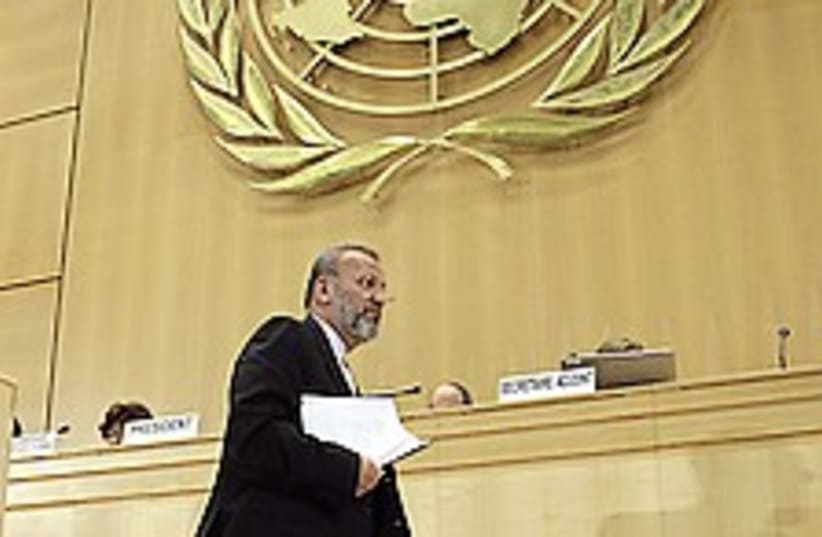Iranian FM: IDF committed 'genocide' in Gaza
Mottaki calls for ICC to prosecute Israeli leaders for 'multiple war crimes and crimes against humanity.'
Israel's recent offensive in Gaza was akin to genocide, Iran's Foreign Minister Manouchehr Mottaki charged in his address at the opening sessions of the UN Human Rights Council's March session in Geneva on Monday.
"The attack against civilian targets are grave violations of international law and constitute war crimes. The violence is aimed at the whole population and can be called genocide, which constitutes a crime against humanity," Mottaki said.
He called for International Criminal Court in The Hague to prosecute Israeli leaders for "multiple war crimes and crimes against humanity."
The text of his speech was provided to The Jerusalem Post by the Geneva-based UN Watch NGO, which issued a sharp retort.
"The council dishonors itself by inviting a notorious Holocaust denier whose regime fuels terrorism, calls for the elimination of a UN member state, and illegally pursues the nuclear means to achieve it.
"Eleanor Roosevelt and René Cassin, the distinguished idealists who founded the council in 1946 in response to the atrocities of the Holocaust, must today be rolling in their graves," said UN Watch's executive director Hillel Neuer.
The former US first lady and the French jurist were actually involved with the council's predecessor, the UN Human Rights Commission.
Speaking with the Post before Mottaki's speech, Israeli Ambassador to the UN in Geneva Roni Leshno-Yaar said he was pessimistic about this session, which ends on March 27.
Since its inception in 2006, the council has passed 26 resolutions that target specific countries, of which 21 were against Israel.
The council held a special session in January regarding Israel's military operations in the Gaza Strip designed to stop rocket attacks against its civilian population, this month's meeting marks the first time since December that the council has met in a regular session.
Leshno-Yaar said he expects it to use it to continue to criticize Israeli military activities in Gaza.
"It will be a very busy and stormy month," he said.
He also expects to see resolutions on the West Bank and Jerusalem. A report on freedom of religion will be presented at this session as well.
In addition to issues relating to Israel, Leshno-Yaar intends to speak on trafficking in women and the right to food.
Other issues likely to come before the council include safe drinking water, sanitation, housing, torture, the rights of internally displaced people and the rights of children and the disabled.
"I expect the council to be more balanced and consider the serious violations of human rights which take place inside and outside the Middle East. This was one of the major failures of the Human Rights Council since its inception. I hope that now under the American leadership this could be fixed," Leshno-Yaar said.
Israel has an observer status at the council, but is not one of its 47 member countries.
On Friday, the United States, which also has observer status, said it intended to change its stance with respect to the council, from disengagement to engagement.
According to Neuer, under president George W. Bush, the US protested the council's anti-Israel stance and its failure to address significant human rights issues in other countries, by not attending the meetings.
It was the only country to abstain itself in this way, Neuer said.
So the US's decision to engage, under the new administration of President Barack Obama, marked a significant change in policy.
He said he believed it was a preliminary step by the US toward seeking membership on the council in May, when Canada's three-year term ends.
"We welcome vigorous US leadership in the council to fight back against the assault on human rights," Neuer said.
if(catID != 151){
var cont = `Take Israel home with the new
Jerusalem Post Store
Shop now >>
`;
document.getElementById("linkPremium").innerHTML = cont;
var divWithLink = document.getElementById("premium-link");
if(divWithLink !== null && divWithLink !== 'undefined')
{
divWithLink.style.border = "solid 1px #cb0f3e";
divWithLink.style.textAlign = "center";
divWithLink.style.marginBottom = "40px";
divWithLink.style.marginTop = "40px";
divWithLink.style.width = "728px";
divWithLink.style.backgroundColor = "#3c4860";
divWithLink.style.color = "#ffffff";
}
}
(function (v, i){
});

